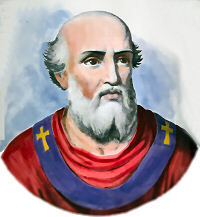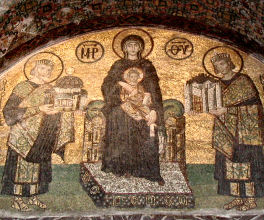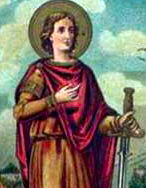20. Then Peter, turning about, sees the disciple whom Jesus loved following; which also leaned on his breast at supper, and said, Lord, which is he that betrays you?
21. Peter seeing him says to Jesus, Lord, and what shall this man do?
22. Jesus says to him, If I will that he tarry till I come, what is that to you? follow you me.
23. Then went this saying abroad among the brethren, that that disciple should not die: yet Jesus said not to him, He shall not die; but, If I will that he tarry till I come, what is that to you?
THEOPHYL. Peter hearing that he was to suffer death for Christ, asks whether John was to die: Then Peter, turning about, sees the disciple whom Jesus loved following; which also leaned on His breast at supper, and said, Lord, which is he that betrays you?
Peter seeing him says to Jesus, Lord, and what shall this man do?
AUG. He calls himself the disciple whom Jesus loved, because Jesus had a greater and more familiar love for him, than for the rest; so that He made him lie on His breast at supper. In this way John the more commends the divine excellency of that Gospel which he preached.
Some think, and they no contemptible commentators upon Scripture, that the reason why John was loved more than the rest, was, because he had lived in perfect chastity from his youth up. Then went this saying abroad among the brethren, that that disciple should not die: yet Jesus said not to him, He shall not die; but, If I will that he tarry till I come, what is that to you?
THEOPHYL. i.e. Shall he not die?
AUG. Jesus says to him, What is that to you? and He then repeats, Follow you Me, as if John would not follow Him, because he wished to remain till He came; Then went this saying abroad among the disciples, that disciple should not die. Was it not a natural inference of the disciple's? But John himself does awes With such a notion: Yet Jesus said not to him, He shall not die; but, If I will that he tarry till I come, what is that to you? But if any so will, let him contradict, and say that what John says is true, viz. that our Lord did not say that that disciple should not die, but that nevertheless this was signified by using such words as John records.
THEOPHYL. Or let him say, Christ did not deny that John was to die, for whatever is born cries; but said, I will that he tarry till I come, i.e. to live to the end of the world, and then he shall suffer martyrdom for Me. And therefore they confess that he still lives, but will be killed by Antichrist, and will preach Christ's name with Elias. But if his sepulcher be objected, then they say that he entered in alive, and went out of it afterwards.
AUG. Or perhaps he will allow that John still lies in his sepulcher at Ephesus, but asleep, not dead; and will give us a proof, that the soil over his grave is moist and watery, owing to his respiration. But why should our Lord grant it as a great privilege to the disciple whom He loved, that he should sleep this long time in the body, when he released Peter from the burden of the flesh by a glorious martyrdom, and gave him what Paul had longed for, when he said, I have a desire to depart and be with Christ? If there really takes place at John's grave that which report says, it is either done to commend his precious death, since that had not martyrdom to commend it, or for some other cause not known to us. Yet the question remains, Why did our Lord say of one who was about to die, I will that he tarry till I come? It may be asked too why our Lord loved John the most, when Peter loved our Lord the most? I might easily reply, that the one who loved Christ the more, was the better man, and the one whom Christ loved the more, the more blessed; only this would not be a defense of our Lord's justice. This important question then I will endeavor to answer. The Church acknowledges two modes of life, as divinely revealed, that by faith, and that by sight. The one is represented by the Apostle Peter, in respect of the primacy of his Apostleship; the other by John: wherefore to the one it is said, Follow Me, i.e. imitate Me in enduring temporal sufferings; of the other it is said, I will that he tarry till I come: as if to say, Do you follow Me, by the endurance of temporal sufferings, let him remain till I come to give everlasting bliss; or to open out the meaning more, Let action be perfected by following the example of My Passion, but let contemplation wait inchoate till at My coming it be completed: wait, not simply remain, continue, but wait for its completion at Christ's coming. Now in this life of action it is true, the more we love Christ, the more we are freed from sin; but He does not love us as we are, He frees us from sin, that we may not always remain as we are, but He loves us heretofore rather, because hereafter we shall not have that which displeases Him, and which He frees us from. So then let Peter love Him, that we may be freed from this mortality; let John be loved by Him, that we may be preserved in that immortality. John loved less than Peter, because, as he represented that life in which we are much more loved, our Lord said, I will that he remain (i.e. wait) till I come; seeing that that greater love we have not yet, but wait till we have it at His coming. And this intermediate state is represented by Peter who loves, but is loved less, for Christ loves us in our misery less than in our blessedness: and we again love the contemplation of truth such as it will be then, less in our present state, because as yet we neither know nor have it. But let none separate those illustrious Apostles; that which Peter represented, and that which John represented, both were sometime to be.
GLOSS. I will that he tarry, i.e. I will not that he suffer martyrdom, but wait for the quiet dissolution of the flesh, when I shall come and receive him into eternal blessedness.
THEOPHYL. When our Lord says to Peter, Follow Me, He confers upon him the superintendence over all the faithful, and at the same time bids him imitate Him in every thing, word and work. He shows too His affection for Peter; for those who are most dear to us, we bid follow us.
CHRYS. But if it be asked, How then did James assume the see of Jerusalem? I answer, that our Lord enthroned Peter, not as Bishop of this see, but as Doctor of the whole world: Then Peter, turning about, sees the disciple whom Jesus loved following, which also leaned on his breast at supper. It is not without meaning that that circumstance of leaning on His breast is mentioned, but to show what confidence Peter had after his denial.
For he who at the supper dared not ask himself, but gave his question to John to put, has the superintendence over his brethren committed to him, and whereas before he gave a question which concerned himself to another to put, he now asks questions himself of his Master concerning others. Our Lord then having foretold such great things of him, and committed the world to him, and prophesied his martyrdom, and made known his greater love, Peter wishing to have John admitted to a share of this calling, says, And what shall this man do? as if to say, Will he not go the same way with us? For Peter had great love for John, as appears from the Gospels and Acts of the Apostles, which give many proofs of their close friendship.
So Peter does John the same turn, that John had done him; thinking that he wanted to ask about himself, but was afraid, he puts the question for him. However, inasmuch as they were now going to have the care of the world committed to them, and could not remain together without injury to their charge, our Lord says, If I will that he tarry till I come, what is that to you? as if to say, Attend to the work committed to thee, and do it: if I will that he abide here, what is that to you?
THEOPHYL. Some have understood, Till I come, to mean, Till I come to punish the Jews who have crucified Me, and strike them with the Roman rod. For they say that this Apostle lived up to the time of Vespasian, who took Jerusalem, and dwelt near when it was taken. Or, Till I come, i.e. till I give him the commission to preach, for to you I commit now the pontificate of the world: and in this follow Me, but let him remain till I come and call him, as I do you now.
CHRYS. The Evangelist then corrects the opinion taken up by the disciples.
24. This is the disciple which testifies of these things, and wrote these things: and we know that his testimony is true.
25. And there are also many other things which Jesus did, the which, if they should be written every one, I suppose that even the world itself could not contain the books that should be written. Amen.
CHRYS. John appeals to his own knowledge of these events, having been witness of them: This is the disciple which testifies of these things. When we assert any undoubted fact in common life, we do not withhold our testimony: much less would he, who wrote by the inspiration of the Holy Ghost. And thus the other Apostles, And we are witnesses of these things, and wrote these things. John is only one who appeals to his own testimony; and he does so, because he was the last who wrote. And for this reason he often mentions Christ's love for him, i.e. to show the motive which led him to write, and to give weight to his history. And we know that his testimony is true. He was present at every event, even at the crucifixion, when our Lord committed His mother to him; circumstances which both show Christ's love, and his own importance as a witness. But if any believe not, let him consider what follows:
And there are also many other things which Jesus did. If, when there were so many things to relate, I have not said so much as the other, and have selected often reproaches and contumelies in preference to other things, it is evident that I have not written partially. One who wants to show another off to advantage does the very contrary, omits the dishonorable parts.
AUG. The which, if they should be written every one, I suppose that even the world itself could not contain the books that should, be written; meaning not the world had not space for them, but that the capacity of readers was not large enough to hold them: though sometimes words themselves may exceed the truth, and yet the thing they express be true; a mode of speech which is used not to explain an obscure and doubtful, but to magnify or estimate a plain, thing: nor does it involve any departure from the path of truth; inasmuch as the excess of the word over the truth is evidently only a figure of speech, and not a deception. This way of speaking the Greeks call hyperbole, and it is found in other parts of Scripture.
CHRYS. This is said to show the power of Him Who did the miracles; i. e that it was as easy for Him to do them, as it is for us to speak of them, seeing He is God over all, blessed for ever.
THE END.
Catena Aurea John 21



 The day of Easter, John was seated in a throne higher than the one occupied by the patriarch, in the church of Sancta Sophia, where he celebrated Mass in the Latin tradition. John was accorded the highest honor when he placed the customary Easter crown on the head of Emperor Justin.
The day of Easter, John was seated in a throne higher than the one occupied by the patriarch, in the church of Sancta Sophia, where he celebrated Mass in the Latin tradition. John was accorded the highest honor when he placed the customary Easter crown on the head of Emperor Justin.  When still a boy of fifteen, Venantius was martyred for his faith in his native city under the Emperor Decius (249-251). With heroic steadfastness he endured many and unspeakably cruel tortures. According to legend, he was scourged, burned with torches and hung headfirst over a smoking fire. He was then thrown to the lions; while they lay like lambs at his feet, he preached the Gospel to the people. This induced many pagans to accept the faith. Finally he was beheaded.
When still a boy of fifteen, Venantius was martyred for his faith in his native city under the Emperor Decius (249-251). With heroic steadfastness he endured many and unspeakably cruel tortures. According to legend, he was scourged, burned with torches and hung headfirst over a smoking fire. He was then thrown to the lions; while they lay like lambs at his feet, he preached the Gospel to the people. This induced many pagans to accept the faith. Finally he was beheaded. 
